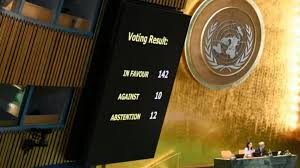NEW DELHI: India has voted in favour of a United Nations General Assembly (UNGA) resolution endorsing the New York Declaration on the peaceful settlement of the Palestinian issue and the implementation of a two-state solution.
The resolution, introduced by France, was adopted with overwhelming support. A total of 142 countries voted in favour, while 10 — including Israel, the United States, Argentina, and Hungary—opposed it. Twelve nations abstained.
The New York Declaration is the outcome of an international conference held in July at UN Headquarters, organised by France and Saudi Arabia. The conference is scheduled to resume later this month.
The declaration urges Israel’s leadership to make a clear, public commitment to a two-state framework, which envisions the creation of a sovereign and viable Palestinian state alongside Israel. It emphasised that effective implementation of this solution is central to ensuring a just and durable settlement, as well as building a better future for both peoples and the wider region.
Prior to the vote, French Ambassador Jérôme Bonnafont recalled that the New York Declaration “lays out a single roadmap to deliver the two-State solution”.
This involves an immediate ceasefire in Gaza, the release of all hostages held there, and the establishment of a Palestinian State that is both viable and sovereign. The roadmap further calls for disarmament of Hamas and its exclusion from governance in Gaza, normalisation of ties between Israel and Arab countries, as well as collective security guarantees.
However, Israel’s Ambassador to the UN, Danny Danon, rejected the resolution, calling it “one-sided.”
“This declaration will not be remembered as a step toward peace, only as another hollow gesture that weakens this Assembly’s credibility,” he said.
Danon claimed that “Hamas is the biggest winner of any endorsement here today” and would declare the resolution as “the fruit of 7 October”.
The high-level UN conference in July was held against the backdrop of the war in Gaza and deteriorating prospects for the two-State solution.
In remarks to the opening segment, UN Secretary-General António Guterres noted that “the central question for Middle East peace is implementation of the two-State solution, where two independent, sovereign, democratic States – Israel and Palestine – live side-by-side in peace and security.”
Israel’s offensive against Hamas began after October 7, 2023, when the latter fired thousands of rockets and sent fighters—through land, air and sea—into Israeli towns near the Gaza Strip during a major Jewish holiday (Simchat Torah) in a deadly offensive branded “Operation Al-Aqsa Flood” in which about 1,200 people were killed and 251 were taken back to Gaza as captives.
Since then Israel has been attacking Hamas with a massive bombardment of the Gaza Strip.
Palestinians say civilians are paying the price in strikes on Gaza, a small coastal strip of land (140 square miles) packed with 2.3 million residents, which has been blockaded for more than 15 years. The war has already claimed over 66,700 lives (64,739 Palestinians and 1,983 Israelis).
Notably, an agreement for the release of hostages and ceasefire in Gaza was announced on January 15 this year which came into effect on January 19.
The agreement included three phases of 42 days each for exchange of hostages and prisoners from both sides.
However, two months later in March, Israel launched surprise airstrikes on Gaza, breaking the ceasefire with Hamas. Netanyahu’s office stated that the strikes were carried out in response to Hamas’s refusal to release hostages and its rejection of proposals to extend the cease-fire.
The war has further intensified since the breaking of ceasefire agreement early this year. Most recently in a major escalation, Israel conducted airstrikes in Doha, marking a dramatic expansion of its military campaign against Hamas beyond the Gaza Strip, where negotiations over a ceasefire remain stalled. Israel stated the operation aimed to eliminate Hamas’ political leadership.
India condemned this attack with Prime Minister Narendra Modi and stressed that New Delhi supports the resolution of issues through dialogue and diplomacy.
Prime Minister Narendra Modi spoke with Qatar’s Amir Sheikh Tamim Bin Hamad Al-Thani and conveyed India’s deep concern over the Israeli strikes in Doha.
“We support resolution of issues through dialogue and diplomacy, and avoiding escalation. India stands firmly in support of peace and stability in the region, and against terrorism in all its forms and manifestations,” Modi said.


